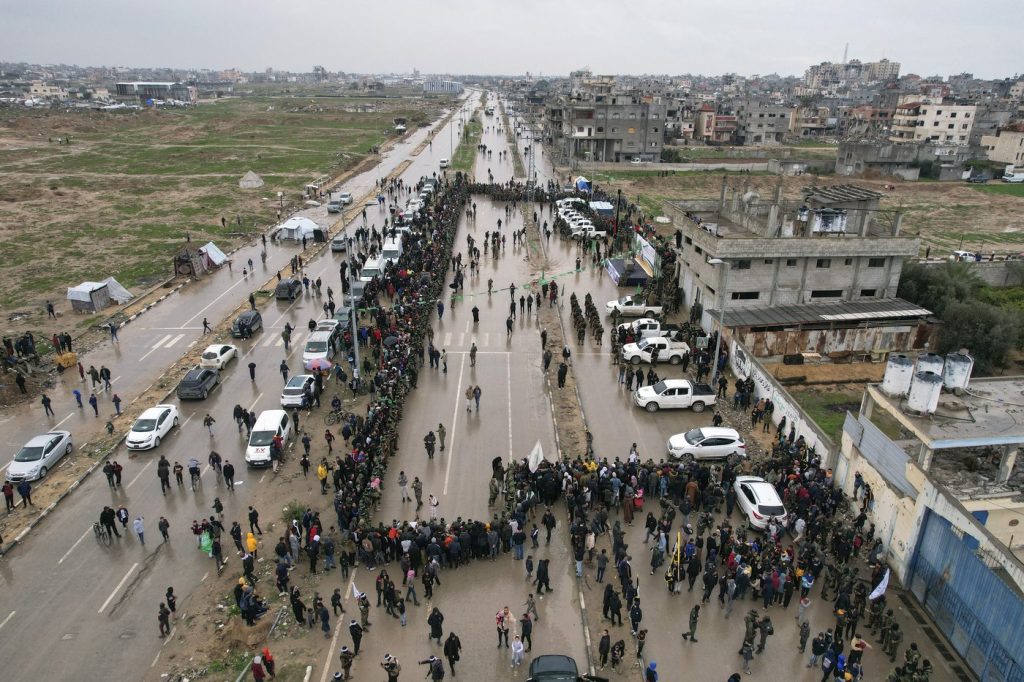NUSEIRAT, Gaza Strip — Hamas released the first two of six Israeli hostages on Saturday, February 22, 2025, amidst escalating tensions that cast uncertainty over a fragile ceasefire agreement between the two opposing sides. The hostages, Tal Shoham, 40, and Avera Mengistu, 38, were escorted out by masked and armed Hamas fighters in Rafah, southern Gaza, before being handed over to Red Cross vehicles. The Israeli military confirmed their safe return shortly afterward.
A few hours later, Red Cross vehicles arrived in Nuseirat for the next planned handover of hostages. This release marks a significant event in the ongoing negotiation for peace, as it will be followed by the release of hundreds of Palestinian prisoners currently held in Israeli jails. The hostage release followed a distressing incident earlier in the week when Hamas mistakenly delivered the wrong body for Shiri Bibas, an Israeli mother who had been abducted along with her children during the hostilities.
The body Hamas returned was later identified as that of an unidentified Palestinian woman, prompting Israeli Prime Minister Benjamin Netanyahu to condemn the act as a "cruel and malicious violation." Hamas claimed it was an unfortunate mistake. Following this incident, Hamas announced that they had subsequently handed over a second body, which Israeli forensic authorities later confirmed to be that of Bibas. Her family expressed mixed emotions, stating, "For 16 months we sought certainty, and now that it’s here, it brings no comfort, though we hope it marks the beginning of closure."
The recent disputes surrounding the body’s identity have led to increased concerns regarding the future of the fragile ceasefire, which has halted over 15 months of conflict. Negotiations for a second phase—wherein Hamas would release dozens more hostages in exchange for a lasting ceasefire and an Israeli withdrawal—promise to be increasingly complex. The hostages released on Saturday are the last living individuals expected to be freed under the current ceasefire's first phase. While their return offers a moment of joy for their families, fears linger regarding the welfare of other hostages taken during the October 7, 2023, Hamas assault, which left 1,200 dead in Israel and sparked the subsequent war.
Shoham, who has dual Austrian citizenship, was visiting in Kibbutz Be'eri when he was abducted during the October 7 attacks. His wife and children had been released earlier in a previous prisoner exchange. Mengistu, an Ethiopian-Israeli, had been held in Gaza since entering voluntarily in 2014. During the live broadcast of the handover, Mengistu's family celebrated as they saw him for the first time in over a decade.
The remaining hostages set to be released on Saturday include Eliya Cohen, 27; Omer Shem Tov, 22; and Omer Wenkert, 23, all of whom were abducted from a music festival during the October 7 attack. Additionally, Hisham Al-Sayed, 36, who also crossed into Gaza years prior, is also part of this release deal.
In exchange for these hostages, over 600 Palestinians are set to be freed from Israeli prisons. The Palestinian prisoners media office has reported that this includes individuals serving life sentences, those with lengthy prison terms, and others who were previously released in prior exchanges. Hamas has indicated plans to release four more bodies next week to complete the first phase of the ceasefire. At present, Hamas is believed to retain approximately 60 hostages, about half of whom are reported to be alive.
Hamas has expressed that it will not release any remaining captives unless a lasting ceasefire is in place and full Israeli withdrawal occurs. In contrast, Netanyahu has maintained his commitment to dismantle Hamas's military and governing structures while ensuring the return of all hostages. This has led to ongoing tensions, as these two goals are widely seen as incompatible.
Meanwhile, uncertainties surrounding this ceasefire have been exacerbated by a proposal from former President Donald Trump to remove approximately 2 million Palestinians from Gaza in a bid to facilitate U.S. ownership and rebuilding of the territory. This plan, which has garnered support from Netanyahu, has faced widespread opposition from Palestinians and Arab nations alike. Trump stated that he was "a little surprised" by the backlash but would not impose his ideas.
As this situation continues to develop, the Israeli military campaign has reportedly resulted in over 48,000 Palestinian casualties, primarily women and children, according to reports from Gaza's Health Ministry. Israel claims to have killed over 17,000 militant fighters, although they have not provided specific evidence to substantiate that figure. The war has devastated substantial parts of Gaza, displacing approximately 90% of the population, many of whom have returned to find their homes in ruins and devoid of resources for rebuilding.










